Monarchism’s last gasp as protest against decline of old WASP hegemony in Canada (and Australia etc)
May 17th, 2017 | By Randall White | Category: Canadian Republic
WEDNESDAY, MAY 17, 2017. Toronto, Ontario.  This coming Monday we will celebrate locally what is known here in Ontario (and other Canadian provinces) as Victoria Day.  (In Quebec the same holiday is now more sensibly called  Journée nationale des patriotes.)
The holiday is nowadays defined as “the last Monday preceding May 25.” And this entrenches its status as part of the present-day Canadian people’s first long weekend of the summer season. It is nicely timed for opening cottages at the lake, getting serious about gardening in your yard, or just lounging around your urban apartment (condo), mentally preparing for the brief burst of treasured hot weather in June (if we’re lucky), July, and August.
Historically, the holiday was first celebrated in 1845 in the old United Province of Canada (ie modern Ontario and Quebec, somewhat organized as one province in partial response to the Lower and Upper Canadian rebellions of 1837—38).
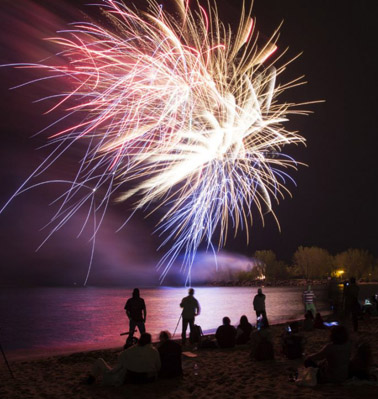
Fireworks on Victoria Day (also traditionally known as Firecracker Day) at Ashbridges Bay in east end of old City of Toronto. Melissa Renwick/Toronto Star.
Then and for many years after Victoria Day was celebrated on the actual day of May 24 – which was in fact the actual birthday of Queen Victoria, Queen of the United Kingdom, 1837—1901, Empress of India, 1876—1901, and first head of state of the Canadian confederation that will be 150 years old this coming July 1, 2017.
You might wonder why a holiday dedicated to the birthday of a Queen who lived across the ocean in another country, and has now been dead for 116 years, would still be celebrated in the diverse and almost grown-up Canada of today. A school-child’s rhyme that people my advanced age learned at their mothers’ knees might give the best answer : “The 24th of May / Is the Queen’s birthday / And if they don’t give us a holiday / We’ll all quit school.”
In the Toronto of the early 21st century the Victoria Day weekend has also acquired some sparse notoriety as a time when “Canadian republicans” who want to see the end of the British monarchy in Canada (and are nothing at all like “American Republicans”) come out to advance their argument on a (hopefully) sunny holiday afternoon.
 This will remind at least a few of us as well that two nights before last showed how “King Charles III airs after sudden death of actor Tim Pigott-Smith … Recording of Tony-nominated performance airs Sunday on PBS.” Â (Our local PBS station in Toronto is “WNED Buffalo.Toronto.”)
This will remind at least a few of us as well that two nights before last showed how “King Charles III airs after sudden death of actor Tim Pigott-Smith … Recording of Tony-nominated performance airs Sunday on PBS.” Â (Our local PBS station in Toronto is “WNED Buffalo.Toronto.”)
And this TV show then reminded me of the new “We don’t need a king bus ads in Toronto,” that the counterweights editors noted just a week or so ago : “Next to a somewhat bemused photo of next-in-line Prince Charles, the ads proclaim : ‘We don’t need a king – Our next head of state should be Canadian.’”
Monarchism as a protest against the local decline of the old WASP hegemony
The editors went on. The ads “are sponsored by the democratic activist group Republic Now || République du Canada. (See their website : ‘We advocate a Canadian head of state for Canada. Our highest office should be held by someone who lives here, shares our citizenship, and is democratically selected.’ On the ads in particular see ‘Ad campaign for a Canadian head of state unveiled today …  April 27, 2017.’)”
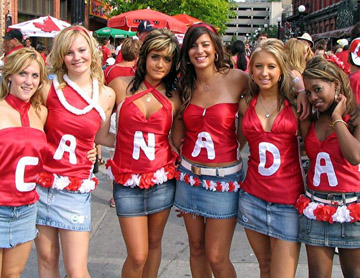
Patriotic Canadian girls in Ottawa on Canada Day. Do you really need a British monarch when you have this?
Personally, I am a great believer in “Canadianizing and democratizing” the role of head of state in Canada’s modern parliamentary democracy. I also believe that both Brexit in the UK and Trumpism in the USA are, among other things, potent protests against the decline of the old White Anglo Saxon Protestant hegemony in Australia, Canada, New Zealand, the United States, and even the United Kingdom itself.
(And, with a few suitable adjustments, even in such other present-day “Commonwealth realms” as Barbados, Belize, Jamaica, and The Bahamas too. Although the first group by itself is also the “Five Eyes” anglo intelligence-sharing alliance that emerged from the Second World War!)
In Canada, as elsewhere, continuing support for the British monarch as head of state is another way of expressing a similar protest against the local decline of the old WASP hegemony. And, all qualms about “populism” aside, in the early 21st century this support remains surprisingly strong among many of the country’s aspiring anglophone elite cultures. It isn’t just “low-information” Canadians who like Donald Trump – or even the late Toronto Mayor Rob Ford – who remain staunchly (and almost pathologically?) Â opposed to long-overdue change.
Recent Ipsos opinion poll on the issue for Global News
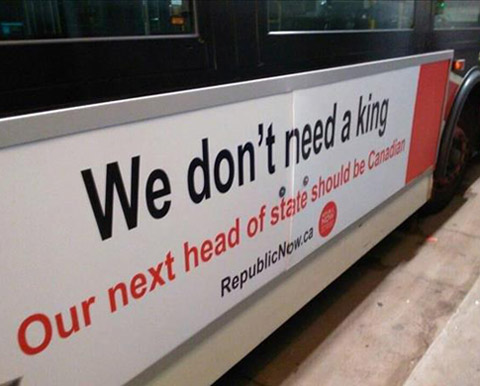 A Global News report on an Ipsos opinion poll about the monarchy in Canada – released just after this past Christmas 2016 – casts some quick bright light on the present state of the issue.
A Global News report on an Ipsos opinion poll about the monarchy in Canada – released just after this past Christmas 2016 – casts some quick bright light on the present state of the issue.
The report, by Monique Scotti, begins by summarizing the main message : “A majority of Canadians now believe that when Queen Elizabeth II dies and Prince Charles ascends to the throne, Canada should cut ties with the monarchy. … Â A new poll, conducted by Ipsos on behalf of Global News, has revealed that 53 per cent of us think it may soon be time to bid farewell to the monarch as our head of state.”
Ms Scotti further explains : “That’s the highest number recorded since 2010, noted Sean Simpson, vice-president of Ipsos Public Affairs … Calls to dump the monarchy were, as usual, loudest in Quebec, where 73 per cent of respondents said the links to Britain should be severed upon the Queen’s death – compared to between 44 and 51 per cent in all the other provinces.”
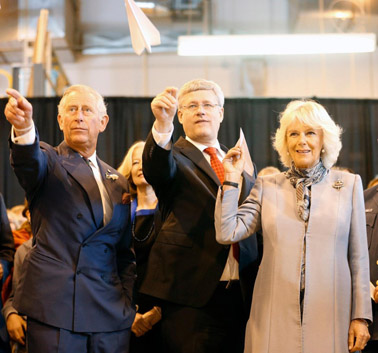
Conservative leader Stephen Harper tried to boost support for the British monarchy in Canada while he was prime minister – especially after he finally managed to win a majority (of seats in parliament) government in 2011 (with less than 40% of the cross-country popular vote!).
Sensing that some of her readers (and certainly her employers at “Global” – a term that used to be rendered as “Empire” in these parts) might find even these numbers unsettling, Monique Scotti also takes care to underline some immediate practical implications here.
She writes : “But Canadian monarchists concerned that there is now enough of a ‘critical mass’ of people who oppose continuing under British rule to prompt changes to the Constitution can probably relax, Simpson added  … ‘We’ve got two very different stories. We’ve got three-quarters of Quebecers who believe this should be the case, but that means support in the rest of the country is at half, or less.’ … On top of that, the challenges of re-opening the Constitution and making fundamental changes to our system of government remain prohibitive, he said.”
Even with all the political cynicism they acquired over Conservative Party of Canada founder Stephen Harper’s (surprisingly successful?) efforts to boost support for the British monarchy in the true north, strong and free, 2006—2015 (and especially after his majority government in 2011), Canadian republicans will tell you that all this is ultimately wishful thinking.
The inevitable Canadian republic will eventually arrive …
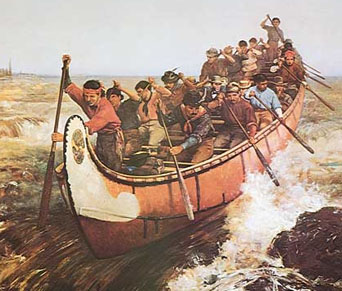
. Canot de maître shooting the Rapids, Frances Anne Hopkins,1879. It was the multiracial and multicultural fur trade, not the British monarchy, that first took Canada from coast to coast to coast.
I agree with this ultimate assessment myself – and I certainly hope there is no undue need to underline “ultimate.”
It may be that we will not finally formally and of course politely wave goodbye to the British monarchy in Canada until 73% of respondents  in all the other provinces as well as Quebec (or even a little more) have told opinion pollsters that is what they want to do.
There is no doubt that we have few bold federal politicians on this front. Our leaders will have to be pushed across the finish line by their followers.
It is a key article of the Canadian republican faith, however, that this is bound to happen.
Stephen Harper has shown how the popular momentum the republican cause in Canada had been developing since the middle of the 1990s can be blunted and stalled by systematic federal government action – from restoring the name “Royal Canadian Navy” and celebrating Tory legends about the War of 1812, to putting up pictures of the Queen in government offices, as in days of yore, etc.
But both the clear defeat of Mr. Harper and his party in the 2015 election, and the current re-appearance of a country-wide Canadian majority for politely waving goodbye to the real King Charles III and his heirs and successors, show that, whatever else, at this moment in time there is certainly not a decisive (or even bare) majority of the Canadian people who want to follow Stephen Harper’s Canada to its bitter end.
Written on the wind
True enough, even the Trudeau Liberals are being notably careful and cautious in their approach to the monarchy’s future – certainly while the present Queen Elizabeth II remains the monarch. (And Prince Charles and his wife will apparently be in Canada for the July 1, 2017 150th anniversary of the present confederation.)
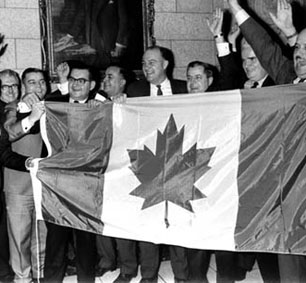
MP s celebrate approval of new independent Canadian flag by a 163 to 78 vote in the Canadian House of Commons, December 15, 1964.
Yet demographically and in every other way as well, even in the English-speaking provinces Canada in 2017 is far from what it was when Elizabeth II became Queen in 1952. (See, eg, the independent Canadian flag of 1965 and the Constitution Act, 1982.) The last-ditch monarchist defence that “the challenges of re-opening the Constitution and making fundamental changes to our system of government remain prohibitive” is both weak-hearted and practically wrong.
Canada is a (Westminster or British-style) parliamentary democracy now, and it will be the same kind of parliamentary democracy after it politely waves goodbye to the British monarchy. The act does not require anything like “fundamental changes to our system of government.” See, eg, such other Westminster parliamentary democracies that are now republics as Ireland, India, Trindad & Tobago, and Dominica. And note the last three are also still members of the present-day Commonwealth – successor to the old global empire on which the sun never dared to set.)
 I’ll conclude for the moment on the same note as the counterweights editors nine days ago : “we are not yet ready, in Ontario or Canada at large, to start dealing altogether practically with such still unresolved essentially constitutional questions as the future of the British monarchy in Canada, Senate reform, Quebec in confederation, the rights of the aboriginal peoples of Canada … But we need to be quite seriously debating these issues now …”
I’ll conclude for the moment on the same note as the counterweights editors nine days ago : “we are not yet ready, in Ontario or Canada at large, to start dealing altogether practically with such still unresolved essentially constitutional questions as the future of the British monarchy in Canada, Senate reform, Quebec in confederation, the rights of the aboriginal peoples of Canada … But we need to be quite seriously debating these issues now …”
The editors carried on : “And eventually there will be some kind of constitutional conference where it will all be addressed, again, only this time with feeling … and success … Just like in 1982 (except for Quebec), and 1992 (well, no, that was a failure : although the politicians agreed ; it was a popular referendum that killed the deal) … Â Even in Canada such things do happen … Opinion polls are starting to show that we mythical ordinary Canadians are starting to see this point, again : according to a recent Angus Reid survey “more than two-in-three say the issue of further reforming or abolishing the Senate is serious enough to merit re-opening Canada’s constitutional debate.”
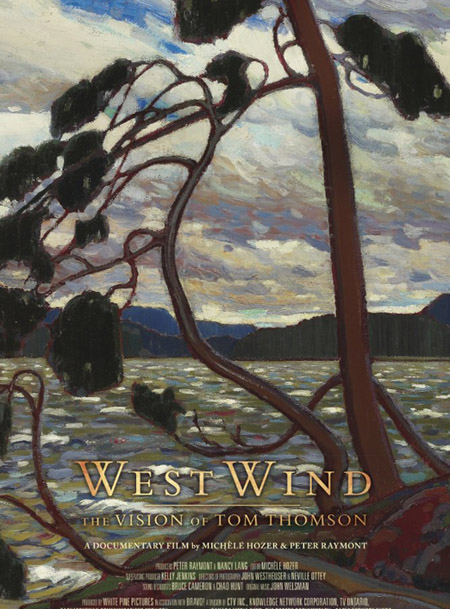 It could all happen at least quite a bit sooner than the various aspiring monarchist elites think … Â in the very end it is written on the wind.
It could all happen at least quite a bit sooner than the various aspiring monarchist elites think … Â in the very end it is written on the wind.
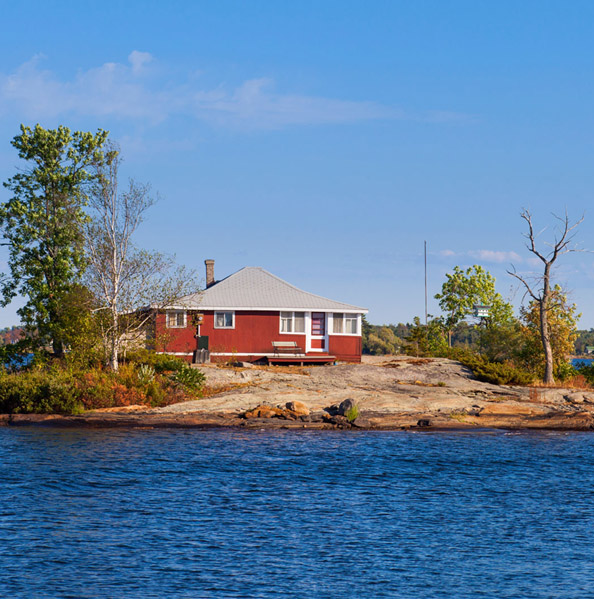
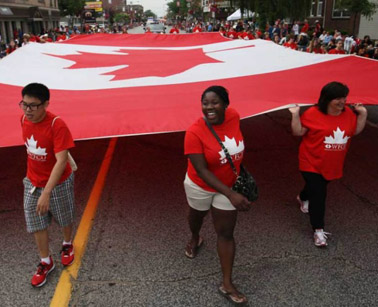


In Huntsville in the 1950’s the jingle went, in a strictly rhythmical chant:
The twenty-fourth of May
Is the Queen’s birthday,
If you don’t give us a holiday
We’ll all run away.